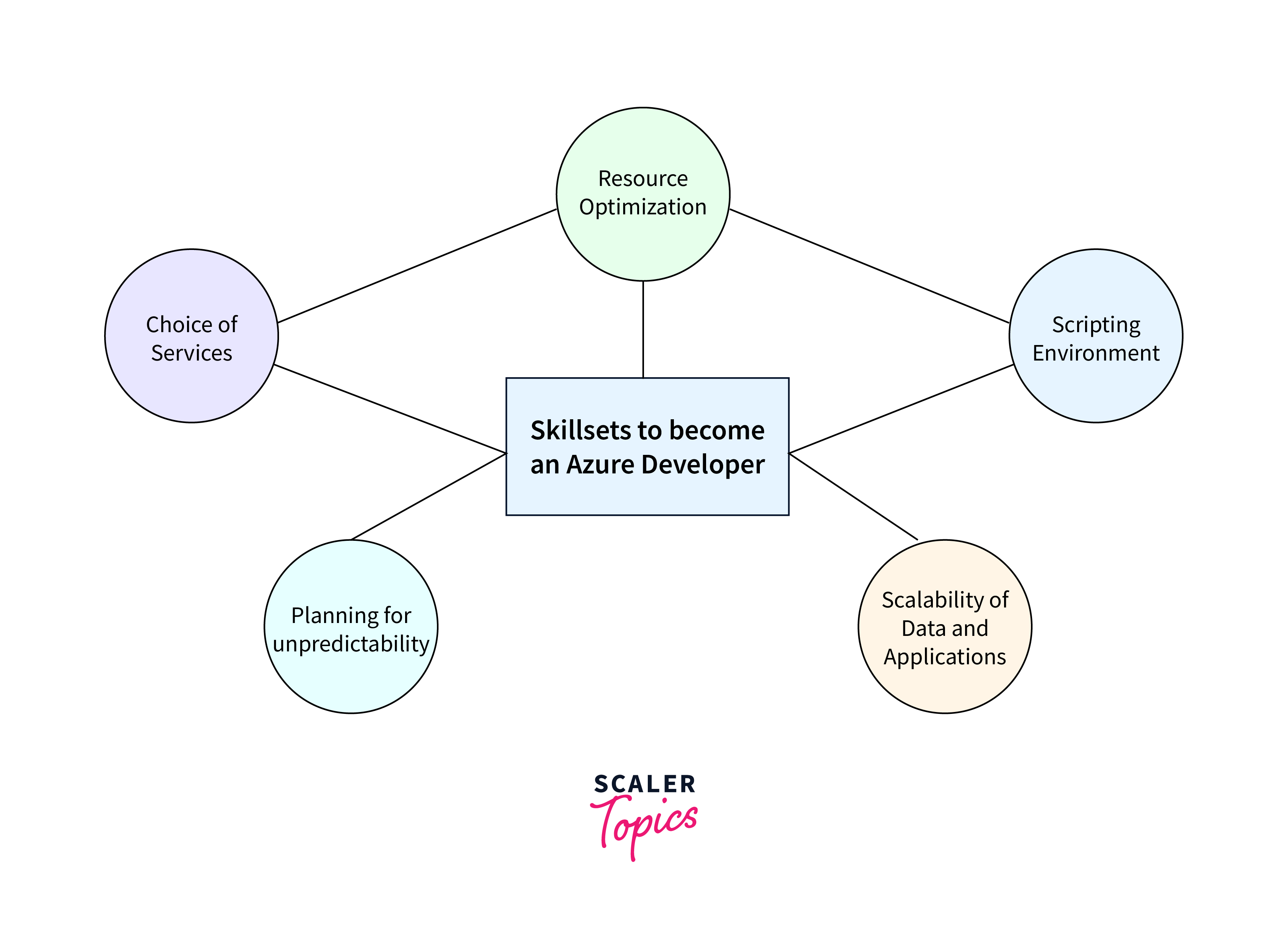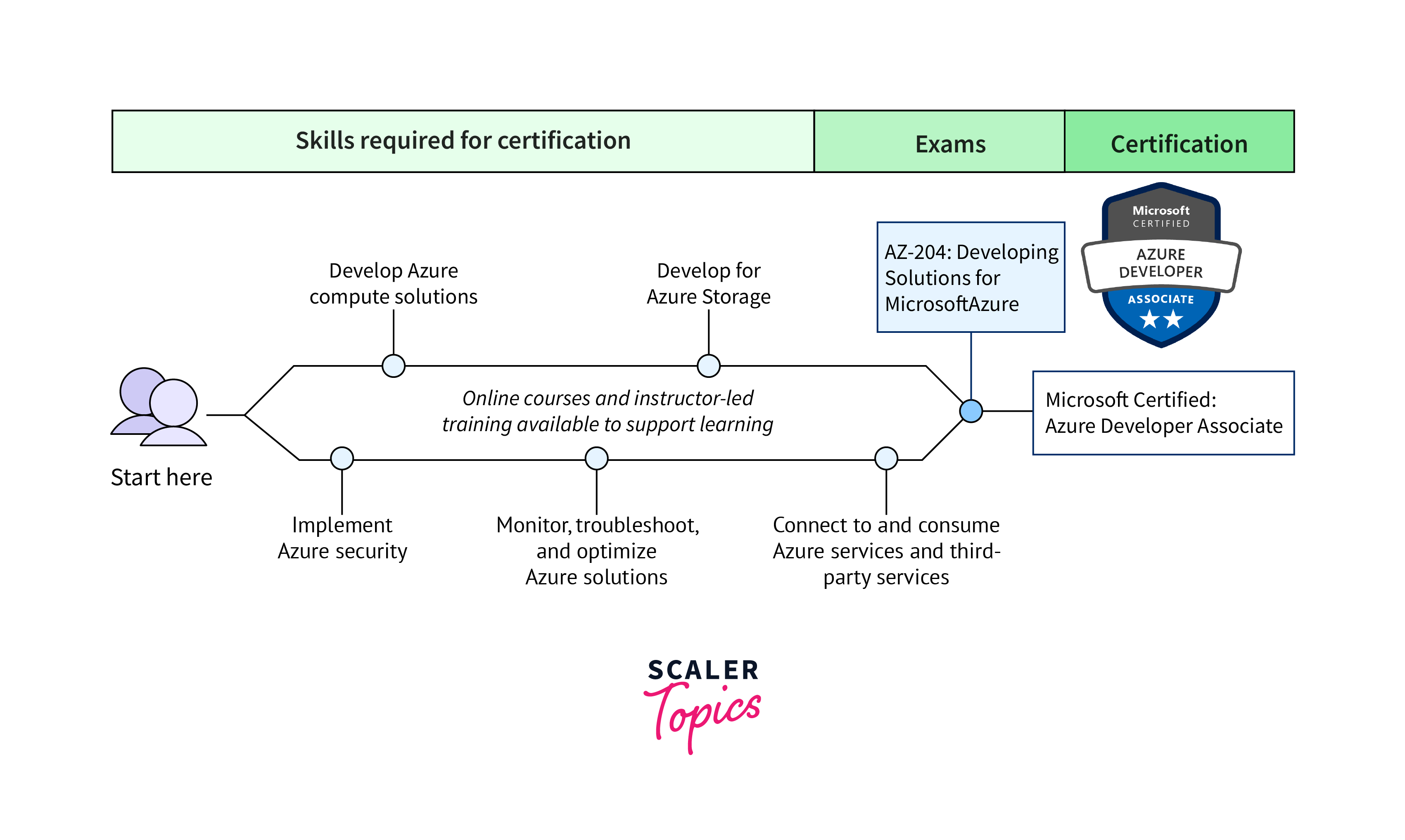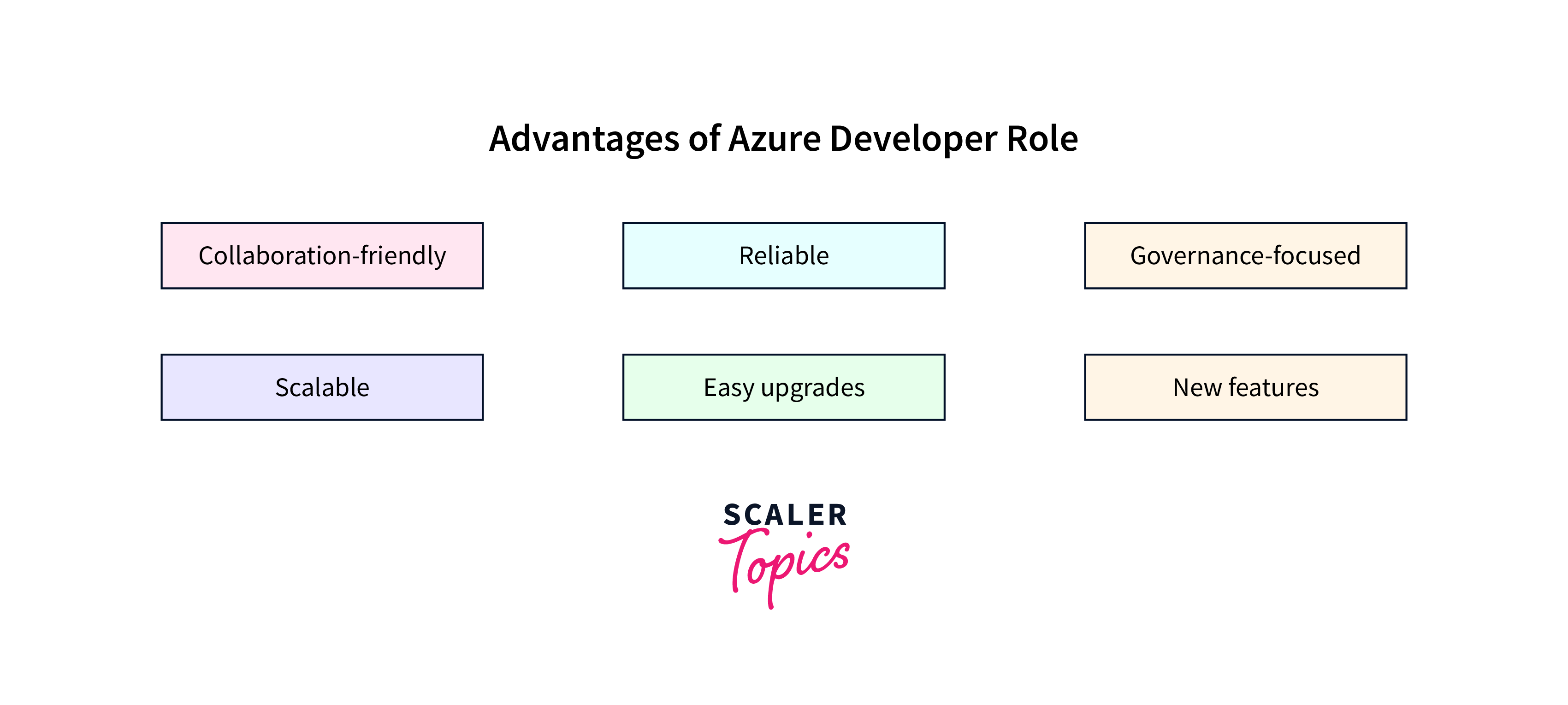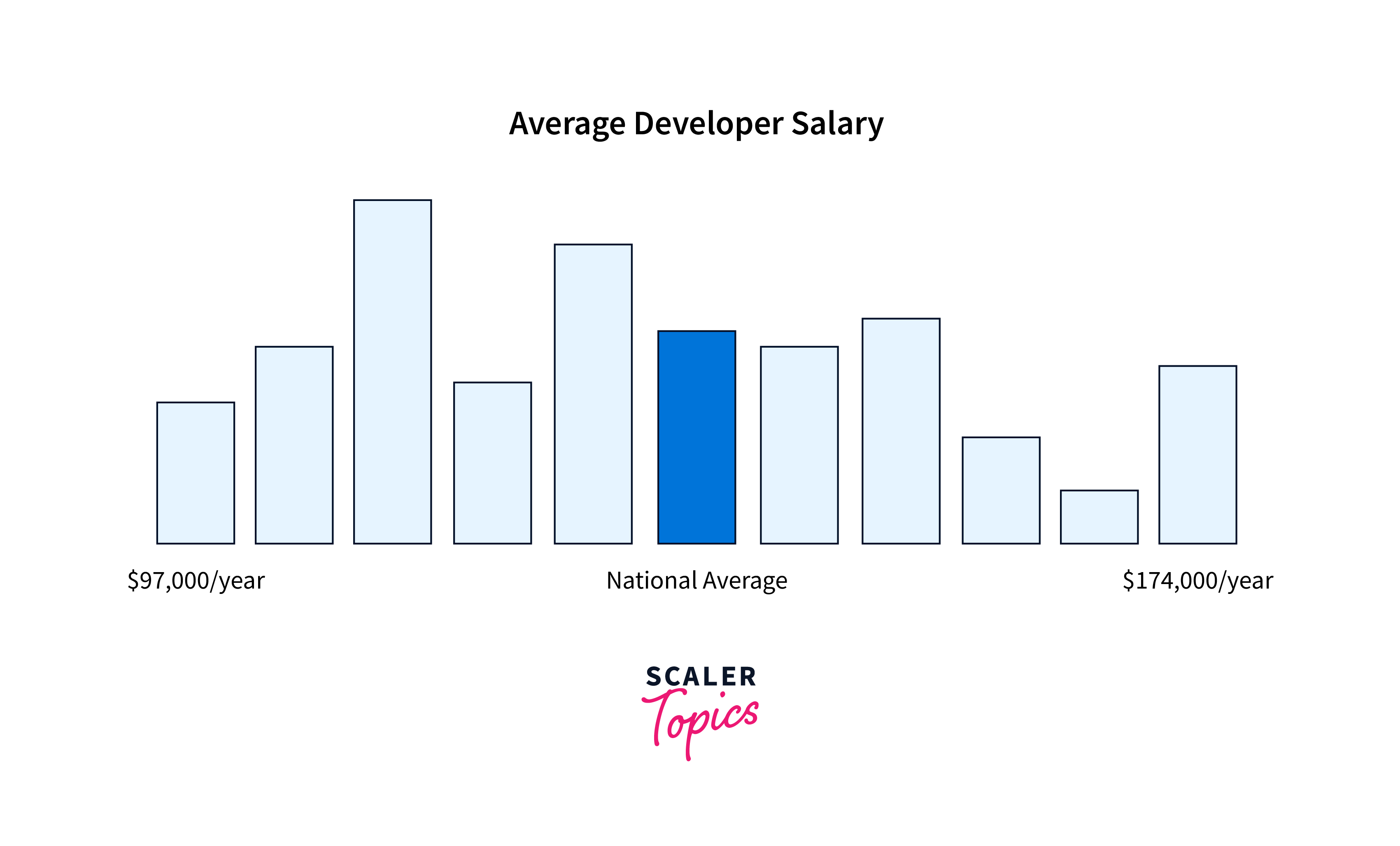What Is Azure Developer And How To Become One?
Overview
Cloud computing is a crucial component for businesses seeking to enhance scalability, and improve efficiency. Microsoft Azure offers a range of services for azure development that empower developers to create, deploy, and manage applications through a global network of data centers. This ecosystem is supported by the role of an Azure Developer, a professional responsible for utilizing Azure's capabilities to craft innovative solutions. This article explores pathways to becoming a proficient Azure Developer.
Who is an Azure Developer?
An Azure Developer is a professional specializing in crafting and managing applications using Microsoft's Azure cloud platform. Their expertise lies in designing, building, and maintaining diverse software solutions that capitalize on Azure's powerful capabilities. These developers leverage a wide array of tools and services within Azure to create high-performing applications, catering to various business requirements. In essence, an Azure Developer is a skilled individual who harnesses the potential of Azure to develop innovative and scalable software solutions.
Why Become an Azure Developer?
Choosing a career path as an Azure Developer offers a range of reasons, making it an attractive and promising choice for individuals in the realm of technology.
- High Demand for Cloud Professionals:
With businesses worldwide shifting their operations to the cloud, the demand for skilled cloud professionals, especially those proficient in Azure, is skyrocketing. - Cutting-Edge Technology Exposure:
Gain exposure to cutting-edge technologies, keeping you engaged and enhancing your skill set. - Versatile Skill Set:
Azure Developers work with a variety of programming languages, tools, and frameworks, providing a versatile skill set that's valuable across different roles and industries. - Diverse Application Development:
Azure isn't confined to a specific type of application; it supports the development of web apps, mobile apps, data-driven solutions, AI applications, and more. - Flexibility in Development:
Azure provides flexible deployment options, enabling developers to choose between different programming languages and frameworks. - Continuous Learning:
The cloud ecosystem is ever-evolving, demanding professionals to stay updated. - Competitive salaries:
The high demand for Azure Developers translates to competitive salaries. - Career Advancement:
Proficiency in Azure can lead to various career advancement opportunities, such as becoming an Azure Solutions Architect, Azure DevOps Engineer, or even pursuing managerial roles in IT. - Community and Networking:
Azure has a vibrant community of developers, resources, and forums with learning opportunities.
Azure Developer Skills Required
Becoming a proficient Azure Developer demands a well-rounded skill set that combines programming prowess, cloud comprehension, and a deep understanding of Azure's ecosystem for azure development. As the role bridges technology and innovation, mastering these skills is essential to excel in crafting cutting-edge solutions. Here are some key skills that Azure Developers need to thrive in their roles:

- Collaboration and Communication:
Effective communication and collaboration skills are essential for working in cross-functional teams, translating technical concepts to non-technical stakeholders, and ensuring seamless project execution. - Continuous Learning:
The cloud landscape evolves rapidly, requiring Azure Developers to stay updated with the latest Azure services, features, and best practices. A commitment to continuous learning is essential. - Analytical Thinking:
Azure Developers need to analyze application performance metrics, identify bottlenecks, and optimize for efficiency. Analytical skills are vital for maintaining high-performing applications.
As we explore the following sections, we'll explore the two categories of skills that Azure Developers must master: Fundamental Skill Sets that serve as necessary conditions for the role, and Specific Skill Sets that pertain to the expertise required in Azure environment.
Fundamental Skill Sets: The Necessary Conditions
Fundamental Skill Sets are essential prerequisites for Azure Developers which include:
- Programming Proficiency:
A strong foundation in languages like C#, Java, Python, or JavaScript is crucial. It facilitates effective code creation for Azure services. - Understanding of Cloud Concepts:
Familiarity with cloud principles, such as virtualization, scalability, and microservices architecture, is vital for crafting applications optimized for the cloud. - Networking Knowledge:
Knowing networking concepts aids in creating applications with robust security and seamless communication within Azure environments.
Specific Skill Sets
Specific Skill Sets refer to the specialized skills that Azure Developers require in areas such as Azure services like azure databricks for azure development. These skills enable developers to effectively design, deploy, and maintain applications within the Azure environment, catering to specific project demands and objectives.
- Azure Services:
A comprehensive understanding of Azure's extensive services, including Azure Databricks, Azure Functions, and Azure App Service, is essential for selecting the right tools. - Database Management:
Proficiency in working with Azure's database services like Azure SQL Database and Cosmos DB is vital for efficient data storage and retrieval in applications. - DevOps Practices:
Familiarity with DevOps methodologies aids in deploying, monitoring, and maintaining applications seamlessly on Azure. - Security Awareness:
A sound understanding of security principles is indispensable. Developers need to create applications with robust security measures, protecting sensitive data and mitigating potential threats. - Infrastructure as Code (IaC):
Knowledge of IaC principles and tools like Azure Resource Manager templates allows developers to define and manage infrastructure using code, ensuring consistency and scalability.
Certifications Required to Become an Azure Developer
Earning certifications is a crucial step towards becoming proficient in azure development. Microsoft offers a range of certifications that validate your skills and expertise in working with the Azure platform. These certifications not only enhance your knowledge but also demonstrate your ability to potential employers and clients. Let us explore some certifications that aspiring Azure Developers should consider:

Microsoft Certified: Azure Developer Associate
This certification is for individuals aiming to design, build, test, and maintain cloud solutions using Azure technologies. To earn this credential, candidates need to demonstrate proficiency in:
- Developing Azure Infrastructure as a Service (IaaS) compute solutions.
- Developing Azure Platform as a Service (PaaS) compute solutions.
- Developing for Azure storage.
- Implementing Azure security.
Microsoft Certified: Azure DevOps Engineer Expert
While not completely focused on azure development, this certification is valuable for Azure Developers as it emphasizes collaboration, communication, and the integration of development and operations. Candidates for this certification should be skilled in:
- Designing and implementing DevOps practices.
- Developing and maintaining Azure Kubernetes Service infrastructure.
- Implementing security and compliance.
Microsoft Certified: Azure Solutions Architect Expert
While not strictly a developer certification, it's relevant for those aiming to design scalable, reliable, and high-performing applications on Azure. This certification focuses on:
- Translating business requirements into secure, scalable, and reliable solutions.
- Architecting advanced applications using Azure services.
- Designing data storage solutions using Azure services.
How do Azure Certifications Prepare You for The Real World?
Azure certifications are designed to reflect real-world scenarios and challenges that professionals might encounter in their roles. These certifications go beyond theoretical knowledge, emphasizing hands-on experience and problem-solving skills that directly translate to practical application. The aspects of certification are:

- Practical Experience:
Certifications require candidates to solve problems, implement solutions, and make informed decisions, mimicking real-world challenges. - Solution Implementation:
Certifications often involve building and configuring various Azure services to create functional solutions. - Troubleshooting Skills:
Many certifications include troubleshooting components where candidates need to diagnose issues and find solutions. - Decision-Making Ability:
Certifications frequently present candidates with multiple options to address a scenario. This encourages critical thinking and helps individuals understand the implications of their choices. - Exposure to Best Practices:
Certification materials often highlight best practices for designing, implementing, and managing Azure solutions. - Collaboration Skills:
Some certifications involve collaborative tasks, fostering skills in communication and teamwork. - Real-Time Problem Solving:
Hands-on components of certifications enable candidates to encounter challenges and provide a dynamic learning experience.
Azure Developer as a Job Role
The role of an Azure Developer holds immense significance in the technology landscape, offering a range of opportunities and benefits. As businesses increasingly embrace cloud computing, Azure Developers play a pivotal role in designing, azure development, and maintaining applications.
Aspects of the Role:
- Azure Developers focus on creating cloud-native applications that are scalable, reliable, and efficient.
- The role demands a deep understanding of Azure's ecosystem, including services like Azure Databricks, Azure Functions, and more. Developers need to select and implement the right services for specific use cases.
- Azure Developers collaborate closely with cross-functional teams, including other developers, architects, and stakeholders. Effective communication and teamwork are essential for successful project execution.
- Ensuring the security of applications and data is a critical aspect. Azure Developers need to implement robust security measures, adhere to compliance standards, and protect sensitive information.
- Azure Developers encounter various challenges in application design, integration, and optimization. Problem-solving skills are crucial for addressing issues in azure development.
Advantages of the Role:

- High Demand:
The increasing adoption of cloud technologies has led to a high demand for skilled Azure Developers. Job opportunities are plentiful across industries, offering job security and growth potential. - Cutting-Edge Technology:
Azure is at the forefront of cloud innovation. Azure Developers have the privilege of working with the latest technologies and staying updated with trends that drive the industry. - Versatility:
The role offers versatility, as Azure Developers work with diverse applications, frameworks, and programming languages. - Career Progression:
Azure Developers can progress to more specialized roles like Azure Solutions Architect, Azure DevOps Engineer, or even managerial positions. Certifications and experience play a pivotal role in career advancement.
Salary Ranges:

Salaries for Azure Developers vary based on factors such as location, experience, job responsibilities, and industry. On average, the annual salary for an Azure Developer can range from $70,000 to $150,000 or more, depending on the aforementioned factors. Entry-level positions generally start at the lower end of the range, while experienced professionals with specialized skills can get higher salaries.
Conclusion
- An Azure Developer specializes in building and managing applications on Microsoft's Azure cloud platform.
- The role involves crafting solutions using Azure's tools and services to address diverse business needs.
- Reasons to become an Azure Developer include high demand in the cloud computing field and exposure to cutting-edge technology.
- The role demands fundamental skills like programming expertise, cloud understanding, and networking knowledge.
- Specific skills entail proficiency in Azure services (e.g., Azure databricks), database management, and DevOps practices.
- Azure certifications validate skills and enhance credibility, offering practical experience that mirrors real-world scenarios.
- Certifications like Microsoft Certified: Azure Developer Associate and Microsoft Certified: Azure DevOps Engineer Expert are valuable.
- Azure certifications prepare developers through hands-on labs, case studies, and simulated projects.
- Azure Developers design applications, collaborate with teams, ensure security, and tackle complex challenges.
- Salaries for Azure Developers range from $70,000 to $150,000 or more based on experience, location, and specialization.
